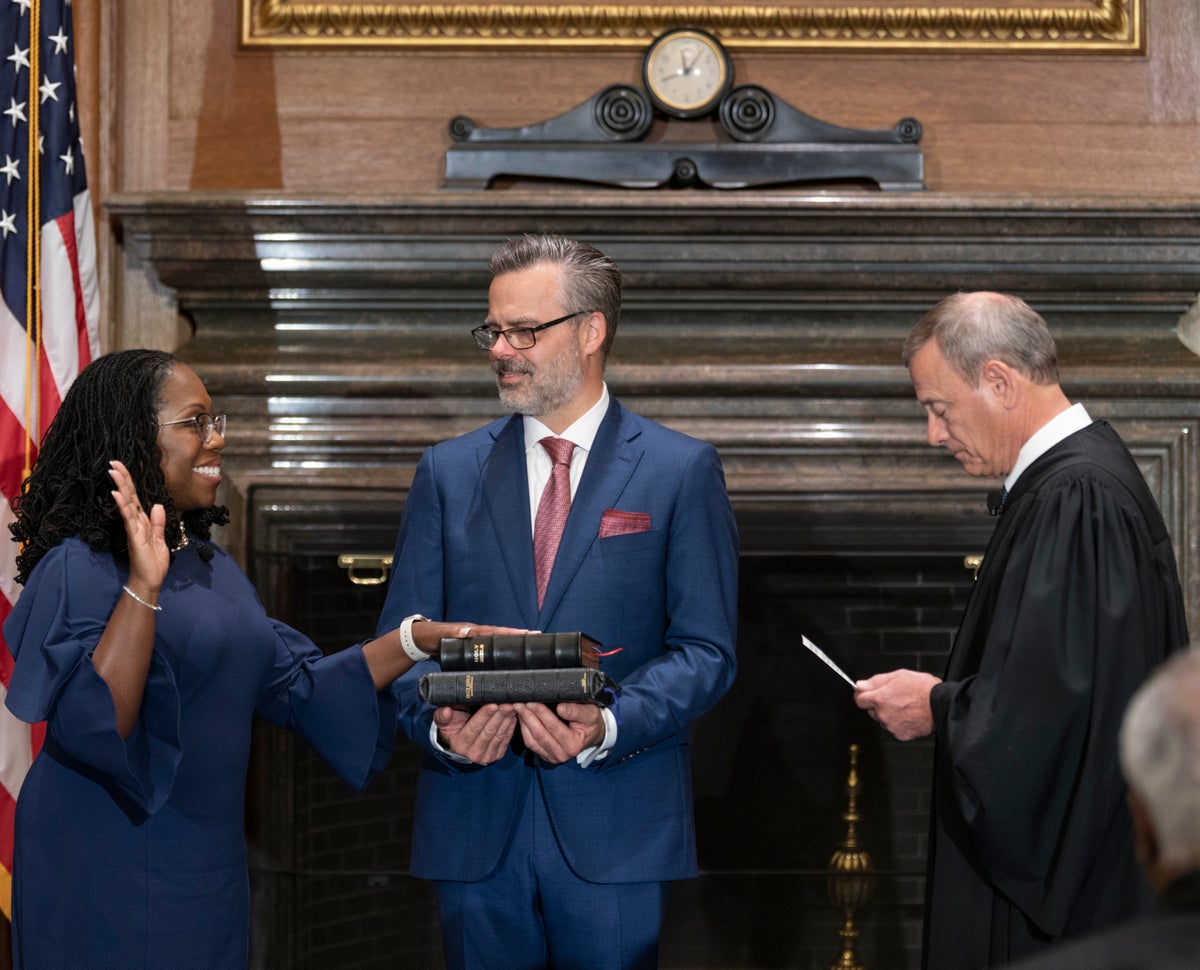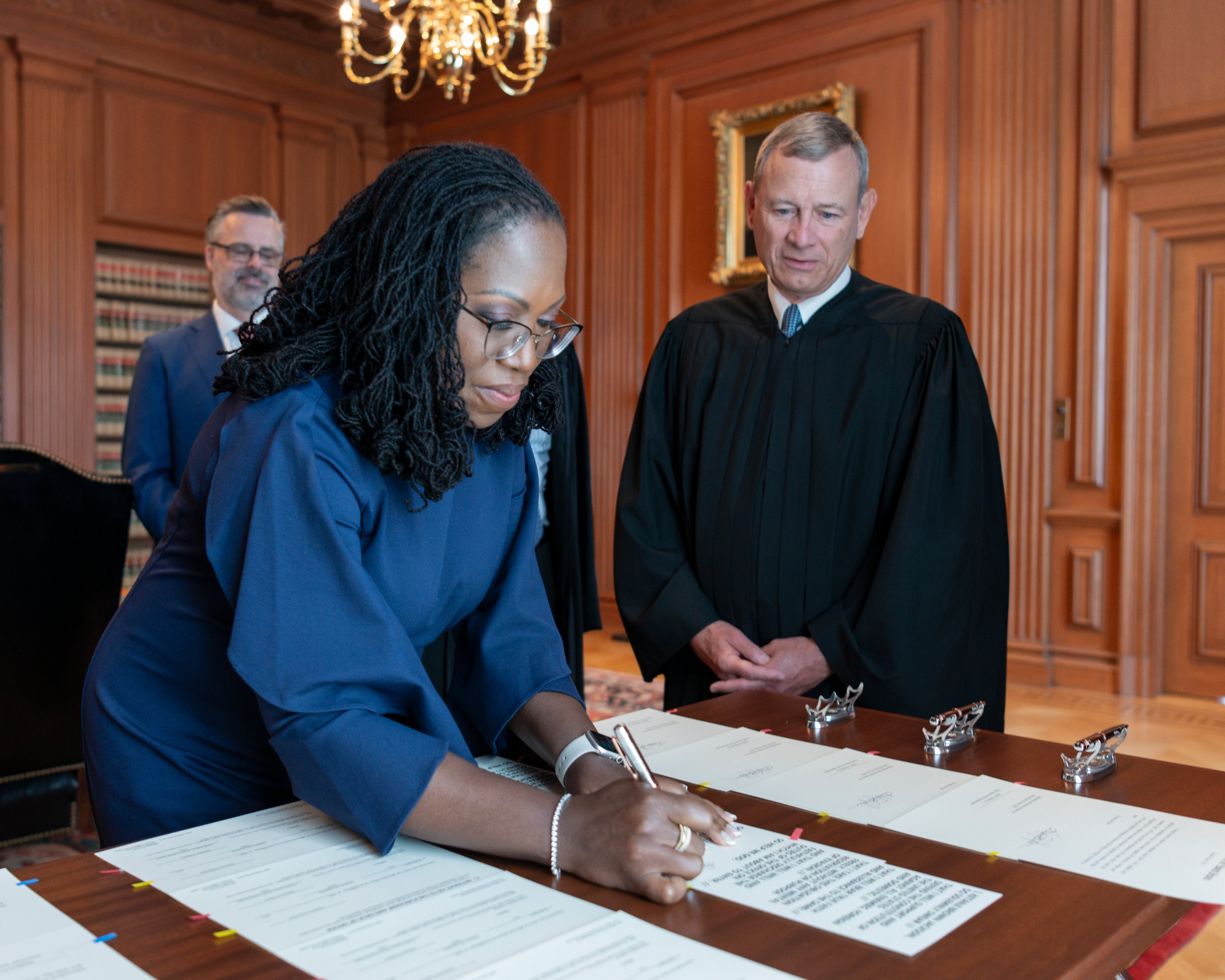
Ketanji Brown Jackson has been sworn in as the 116th justice on the US Supreme Court, the first Black woman and first former public defender to join the nine-member panel.
She was sworn into the role at noon on 30 June by Chief Justice John Roberts and retiring Justice Stephen Breyer, whose retirement is effective on Thursday following 30 years on the nation’s high court.
The chief justice administered the constitutional oath and Justice Breyer administered the judicial oath in a small ceremony with members of Justice Jackson’s family present. She was sworn into the role on a Bible held by her husband Patrick.
“I’m pleased to welcome Justice Jackson to the court and to our common calling,” said Justice Roberts, who shook Justice Jackson’s hand after her oaths. The chief justice said there will be a would be a formal ceremony in the fall, but the oaths on Thursday “allow her to undertake her duties, and she’s been anxious to get to them without any further delay”.
In a statement, she said: “With a full heart, I accept the solemn responsibility of supporting and defending the Constitution of the United States and administering justice without fear or favor, so help me God.”
President Joe Biden later issued a statement saying her swearing-in ceremony “represents a profound step forward for our nation, for all the young, Black girls who now see themselves reflected on our highest court, and for all of us as Americans.”
“The Supreme Court just gained a colleague with a world-class intellect, the dignified temperament the American people expect of a justice, and the strongest credentials imaginable,” the president said.

The ceremony came just two hours after the new conservative-majority court ended its latest term, concluding a series of rulings with far-reaching implications for abortion rights,the Second Amendment, environmental protections, Indigenous sovereignty, and religion in schools.
Following a summer recess, the justices will return for a 2022-2023 session to consider new cases and hear oral arguments.
Justice Jackson – who was nominated by President Biden and confirmed by the US Senate earlier this year, after Justice Breyer announced his retirement and opened a path for his once-former clerk to ascend to the high court – will likely not re-shape the court’s conservative-majority balance.
She was confirmed in the Senate on 7 April by a vote of 53 to 47, with all 50 Democratic senators voting in her favour, joined by only three Republicans – Mitt Romney, Lisa Murkowski and Susan Collins.
During her confirmation hearings, Republican members of Congress and right-wing media personalities sought to undermine her legitimacy, scrutinising her nine-year record on the federal bench and experience as a federal public defender in cases involving people detained at Guantanamo Bay.
Judge Jackson is also the first Supreme Court justice with significant criminal defence experience since Thurgood Marshall, the influential civil rights attorney whose legal arguments dismantled segregation and sought an end to legalised discrimination, work that had a lasting influence on his decision-making as the nation’s first Black Supreme Court justice.
Following his retirement in 1991, no other justice has had any experience representing some of the most vulnerable people in the criminal justice system, or handling the kinds of potentially life-or-death criminal cases that have come before the court.
From 1999 to 2000, Justice Jackson erved as a clerk to Breyer. She also served as a law clerk for First Circuit Court of Appeals Judge Bruce Selya from 1997 to 1998, and to Massachusetts District Judge Patti Sarlis from 1996 to 1997.
She served as an assistant federal public defender from 2005 to 2007. In 2009, she was nominated by then-President Barack Obama to serve as vice chair on the United States Sentencing Commission.
In 2012, she was nominated to serve as a judge in US District court in Washington DC. President Biden nominated her to serve as a federal appeals court judge in Washington DC in March 2021.
During a ceremony at the White House in April following her confirmation in the Senate, then-Judge Jackson said that it “has taken 232 years and 115 prior appointments for a Black woman to be selected to serve on the Supreme Court of the United States.”
“But we’ve made it,” she said. “We’ve made it. All of us.”







